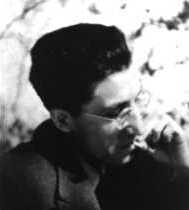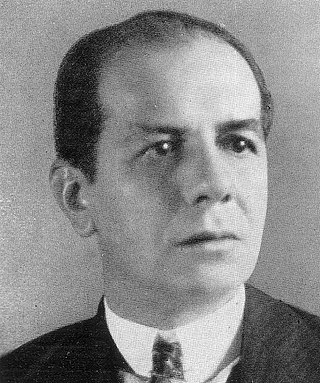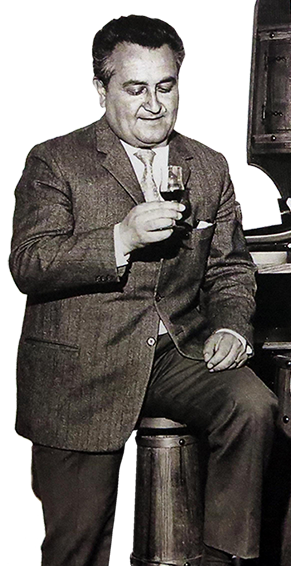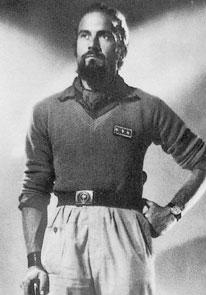Plot
The novel opens with the description of one of the nightmares, which crowd the nights of Stefano Illuminati, the main character. The nightmares had begun from an episode of 1943. Stefano, who was 13 years old and lived in the Langhe, occupied by the Nazis, had killed as a joke a German man with a revolver stolen to his father, that was a fascist colonel. Then he had hidden the body, not saying anything to anybody, not even to his trusted friend Francesco, with whom he had talked about a similar project.
Twenty years later, Stefano lives in Rome; he hasn't returned to his family in Piedmont for many years. Coming from a difficult year, disappointed, he decides to go on a journey to the Langhe, to make order in his life. He is followed by Laura, named as Lu, who was his mistress. Lu and Stefano had been closely to have a child, but they had renounced and their relationship had become a simple friendship, even if Lu is haunted by the thought of her missed motherhood.
During the slow voyage, with stages Pisa, Bolsena, Piacenza and Campione d'Italia before arriving in Piedmont, Stefano recurs his life. Stefano's grandfather was a great one for parties, woman and food; antifascist, he is dead just after the Italy's join in the Second World War. In a big house in the Piedmontese countryside Stefano spent the summer playing with his best friend Francesco, son of a farmer. Doro, who takes care about fields and barns, has communist sympathies; he will die thrown in a well, desperate for the death of a pig, who was his economical hope during the period of the nazi's occupation.
Stefano's father, Giacomo Illuminati, husband of a grandfather's daughter, is an austere soldier, army's colonel, that tries to instill in Stefano the discipline, obliging him to answer "comandi" to every calling. Convinced supporter of the fascist regime, the colonel performs service in Piacenza, where Stefano and his mother spent the winter and where Stefano has to participate as a balilla to the youth rallies.
The colonel renounces to participate to military expeditions to stay close to his family and this causes him great moan. His beliefs fall after the 1943 armistice: forced to escape from Piacenza to break out from Germans, he arrives in the Langhe, where Stefano and his mother had been living since a long time: he is unrecognizable, turned into his own shadow, with a long beard and a wasted uniform, that was unthinkable.
The killing's episode of a German happen during the following months. At the beginning of 1944 Stefano, dizzy by the facts, wants to do something, and, 14 years old, he decides to escape. In Milan he managed to make himself look older and in a barrack of the fascist Guardia Repubblicana give him a warrant and send him to La Spezia, where he's recruited in the Decima Mas. In the following months the oldest fellow soldiers wait the occasion to do something in vain. Stefano escapes and returns home when two marines older than him unsuccessfully try to introduce him in a brothel.
In Piedmont, there is the rapprochement with Francesco, and also his join to the partisan fight. Stefano is in Turin on the Liberation day (25 April). In the following years Stefano is involved in left wing movements, then he moved to Rome, where he starts to work in an office. The colonel remains alone in the Langhe house, with the company of the faithful housewife Caterina, always plunged in empty studies, without seeing Stefano for many years.
When Stefano and Lu arrive at colonel's house, the relationship between father and son is difficult and superficial , but the strictness of the colonel is only a mask. When he talks with Lu, the colonel asks constantly of Stefano, he wants to know about his life and his success. Stefano, before leaving, meets again Francesco, distrusted from the youth enthusiasms, convinced not to have succeeded to realise what he fought for. The voyage seems to have restored him because he concludes that memories won't be abandoned and that we will be condemned only if the readers could refuse to express the secret goodness that wait us every morning.

The Auxiliary Corps of the Black Shirts' Action Squads, most widely known as the Black Brigades, was one of the Fascist paramilitary groups, organized and run by the Republican Fascist Party operating in the Italian Social Republic, during the final years of World War II, and after the signing of the Italian Armistice in 1943. They were officially led by Alessandro Pavolini, former Minister of Culture of the fascist era during the last years of Fascist Italy.

Cesare Pavese was an Italian novelist, poet, short story writer, translator, literary critic, and essayist. He is often referred to as one of the most influential Italian writers of his time.

Stefano Delle Chiaie was an Italian neo-fascist terrorist. He was the founder of Avanguardia Nazionale, a member of Ordine Nuovo, and founder of Lega nazionalpopolare. He went on to become a wanted man worldwide, suspected of involvement in Italy's strategy of tension, but was acquitted. He was a friend of Licio Gelli, grandmaster of P2 masonic lodge. He was suspected of involvement in South America's Operation Condor, but was acquitted. He was known by his nickname "il caccola" as he was just over five feet tall - although he stated that originally, the nickname came from his very young involvement, at age 14, in the Italian Social Movement (MSI), a neo-fascist political party established after the war.

Ludovico de' Medici, also known as Giovanni delle Bande Nere was an Italian condottiero. He is known for leading the Black Bands and serving valiantly in military combat under his third cousins, Pope Leo X and Pope Clement VII, in the War of Urbino and the War of the League of Cognac, respectively.

Giovanni Agnelli was an Italian businessman. He cofounded Fiat S.p.A, an automotive industrial company, in 1899.

The Duchy of Sora was a semi-independent state in Italy, created in 1443 by King Alfonso I of Naples and dissolved in 1796. It occupied the south-eastern part of what is today Lazio, bordering what is now Abruzzo. Its capital was first Sora, and later, under the Boncompagni family, Isola di Sora.

Nizza Monferrato is a comune (municipality) in the Province of Asti in the Italian region of Piedmont, located about 60 kilometres (37 mi) southeast of Turin and about 20 kilometres (12 mi) southeast of Asti.

Giovanni Maria delle Piane was an aristocratic Genovese who served as primary court painter for over 60 years in the late-Baroque period. He is also known as "il Molinaretto".

Walter Audisio was an Italian partisan and communist politician, also known by his nom-de-guerreColonel Valerio. A member of the Italian resistance movement during World War II, Audisio was involved in the death of Benito Mussolini, and personally executed the dictator and his mistress Clara Petacci according to the generally accepted account of the event.
Giovanni Arpino was an Italian writer and journalist.
Giovanni Pesce was an Italian anti-fascist partisan who fought in the Spanish Civil War and World War II. A former Communist councillor for Milan, he wrote extensively about his experiences in several books.

Enrico Martini Mondovì, 29 January 1911 – Turkey, 19 September 1976) was an Italian soldier and partisan, an Alpini Major, founder of the 1 Group Alpine Divisions in the Italian Resistance, and a recipient of the Gold Medal of Military Valor.

Pier Antonio Quarantotti Gambini was an Italian writer and journalist, author of novels, poetry, and essays.

Antonio Stefano Benni was an Italian entrepreneur and politician who served as President of the General Confederation of Italian Industry from 1923 until 1934.

Arnaldo Rivera (1919–1987) was an Italian teacher, entrepreneur and partisan. For almost forty years he was the mayor and the primary school teacher of Castiglione Falletto, so 1958 he founded the Cantina Terre del Barolo, one of the oldest and largest cooperative wineries in Piedmont still active.

The Brigate Garibaldi or Garibaldi Brigades were partisan units aligned with the Italian Communist Party active in the armed resistance against both German and Italian fascist forces during World War II.
Aldo Braibanti was an Italian poet, essayist, screenwriter, playwright, director, and visual artist. A communist and anti-fascist, he fought as a partisan in the Italian Resistance, returning to his intellectual pursuits after the war. He dedicated himself to visual arts, cinema, theater, and literature, as well as to myrmecology and ecology.

Francesco Colombo was an Italian Fascist soldier and policeman, founder and leader of the Legione Autonoma Mobile "Ettore Muti", an anti-partisan unit of the Italian Social Republic infamous for its atrocities.

Piero Balbo was an Italian Resistance leader during World War II.
Giuseppe Lombardo Radice was an Italian pedagogist and philosopher.















